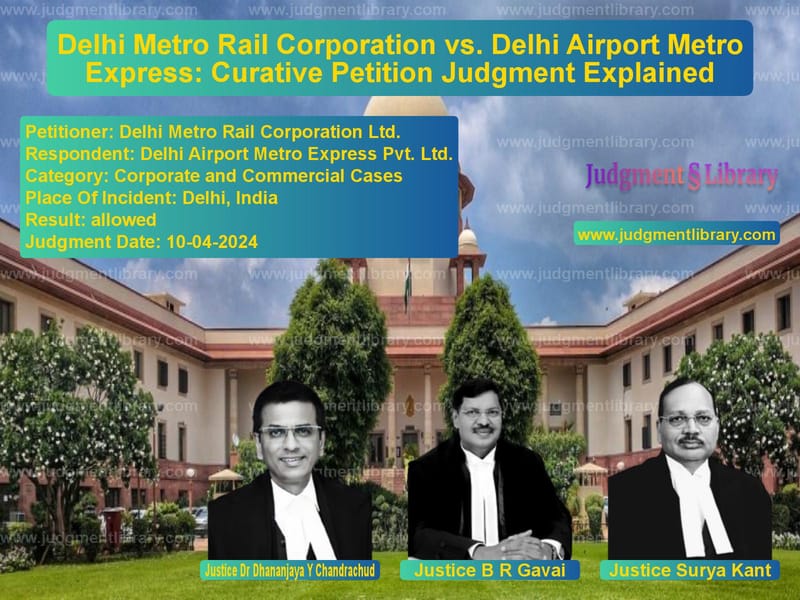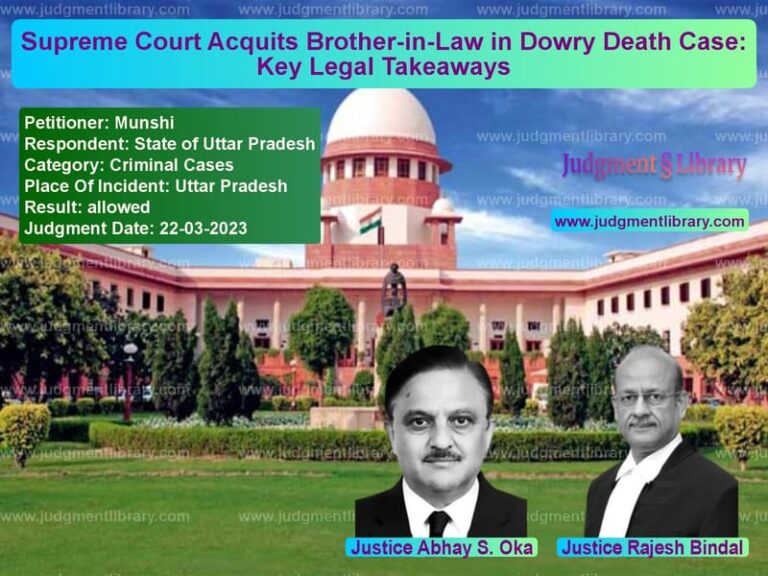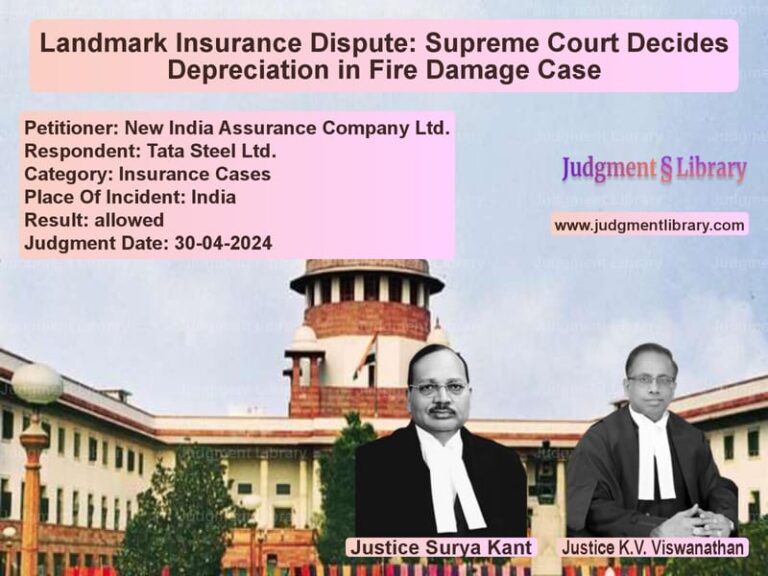Delhi Metro Rail Corporation vs. Delhi Airport Metro Express: Curative Petition Judgment Explained
The present case deals with a series of legal proceedings involving the Delhi Metro Rail Corporation Ltd. (DMRC) and Delhi Airport Metro Express Pvt. Ltd. (DAMEPL), concerning the termination of a concession agreement and the subsequent arbitral award. This judgment, delivered in the context of curative petitions filed by DMRC, explores issues of contractual obligations, arbitral findings, and the scope of interference by courts with arbitral awards under Indian law.
The dispute arises from the 2008 agreement between DMRC and DAMEPL, which established a public-private partnership to build and operate the Delhi Airport Metro Express (AMEL) line. The key issue in this case was the termination of the concession agreement by DAMEPL, which claimed that defects in the civil structure of the metro line, particularly cracks in the girders, had a material adverse effect on its ability to operate the metro line. DAMEPL, therefore, sought to terminate the agreement. DMRC, however, contended that the defects were minor and did not justify such drastic action, initiating arbitration proceedings to resolve the dispute.
Factual Background
The 2008 agreement between DMRC and DAMEPL outlined the roles and responsibilities of each party in the development, operation, and maintenance of the AMEL line. DAMEPL was responsible for the design, supply, installation, and commissioning of the rail systems, while DMRC handled land acquisition and civil structures. In 2012, DAMEPL cited delays in access to stations and faults in the metro line as reasons for deferring the concession fee. As operations progressed, DAMEPL halted the metro services, alleging that the line was unsafe to operate due to defects in the civil structure.
In response to these issues, DAMEPL issued a ‘cure notice’ in July 2012, listing several defects that it claimed had not been rectified by DMRC. After the stipulated 90-day cure period, DAMEPL issued a termination notice in October 2012, claiming that DMRC had failed to cure the defects. DMRC, in turn, initiated arbitration proceedings in October 2012, seeking to challenge the termination of the agreement.
Arbitral Tribunal’s Findings
The arbitral tribunal, which consisted of engineers with expertise in the field, considered several issues regarding the defects in the civil structure. It found that the defects, such as cracks and twists in the girders, had a material adverse effect on the performance of DAMEPL’s obligations under the concession agreement. The tribunal noted that while some efforts were made to repair the defects, they had not been fully cured within the 90-day period specified in the agreement.
On the issue of termination, the tribunal examined whether DAMEPL was justified in terminating the agreement under clause 29.5.1 of the concession agreement. It held that the defects in the civil structure were significant enough to cause a material adverse effect, thereby justifying DAMEPL’s decision to terminate the agreement. The tribunal also noted that the speed restrictions imposed by the Commissioner of Metro Railway Safety (CMRS) were indicative of the line’s unsafe condition, even though the certificate was issued allowing operations at reduced speeds.
High Court and Supreme Court’s Review
DMRC challenged the arbitral award in the Delhi High Court, but the Single Judge upheld the award, noting that the tribunal had analyzed the evidence thoroughly and arrived at a plausible conclusion. The Division Bench of the High Court, however, found the award to be patently illegal, criticizing the tribunal’s treatment of the CMRS certificate and its reasoning on the termination issue. The High Court emphasized that the CMRS certificate should have been given more weight, as it indicated that the metro line could operate safely, which contradicted DAMEPL’s claims of material defects.
The Supreme Court, while reviewing the High Court’s judgment, focused on the scope of curative jurisdiction under Article 142 of the Constitution. The Court reiterated that curative petitions may be entertained in cases where there has been a miscarriage of justice or a grave error, even after the dismissal of a review petition. The petitioners in this case argued that the award was perverse and failed to consider vital evidence, including the CMRS certificate, which had deemed the metro line safe for operation.
Judge’s Key Findings and Reasoning
In its judgment, the Supreme Court highlighted the following key findings:
- Curative Petition Jurisdiction: The Court observed that curative petitions are meant to prevent a miscarriage of justice, particularly in cases where an error of law or fact has resulted in an unjust outcome. It emphasized that this jurisdiction should not be invoked lightly but only in exceptional circumstances where the final judgment of the Court leads to irremediable injustice.
- Interference with Arbitral Awards: The Court reaffirmed the principles of minimal interference with arbitral awards, emphasizing that courts should not reappreciate evidence or substitute their judgment for that of the arbitrator. The Court noted that the Tribunal’s findings regarding the defects in the metro line were based on sound technical evidence.
- Termination Clause Interpretation: The Court disagreed with the Division Bench of the High Court, which had found the tribunal’s interpretation of the termination clause unreasonable. The Court held that the tribunal had correctly interpreted the clause, considering the material adverse effect of the defects on DAMEPL’s ability to perform under the contract.
- Relevance of the CMRS Certificate: The Court disagreed with the view that the CMRS certificate was irrelevant to the validity of termination. It held that the certificate, which confirmed that the metro line could operate safely under certain conditions, did not alter the fact that DAMEPL had legitimate concerns regarding the defects that compromised the integrity of the structure.
Conclusion
The Supreme Court ultimately allowed the curative petition, restoring the judgment of the Division Bench of the High Court. The Court found that the arbitral award suffered from patent illegality and was perverse, as it ignored vital evidence, including the CMRS certificate. The judgment serves as an important reminder of the Court’s curative jurisdiction and its role in ensuring that arbitral awards are consistent with the law and principles of justice.
Petitioner Name: Delhi Metro Rail Corporation Ltd..Respondent Name: Delhi Airport Metro Express Pvt. Ltd..Judgment By: Justice Dr Dhananjaya Y Chandrachud, Justice B R Gavai, Justice Surya Kant.Place Of Incident: Delhi, India.Judgment Date: 10-04-2024.
Don’t miss out on the full details! Download the complete judgment in PDF format below and gain valuable insights instantly!
Download Judgment: delhi-metro-rail-cor-vs-delhi-airport-metro-supreme-court-of-india-judgment-dated-10-04-2024.pdf
Directly Download Judgment: Directly download this Judgment
See all petitions in unfair trade practices
See all petitions in Company Law
See all petitions in Corporate Governance
See all petitions in Judgment by Dhananjaya Y Chandrachud
See all petitions in Judgment by B R Gavai
See all petitions in Judgment by Surya Kant
See all petitions in allowed
See all petitions in supreme court of India judgments April 2024
See all petitions in 2024 judgments
See all posts in Corporate and Commercial Cases Category
See all allowed petitions in Corporate and Commercial Cases Category
See all Dismissed petitions in Corporate and Commercial Cases Category
See all partially allowed petitions in Corporate and Commercial Cases Category







